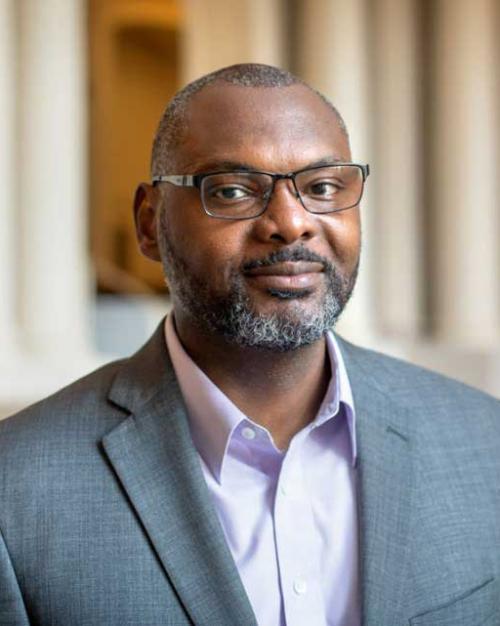On July 15, 1776, the signing of the Declaration of Independence was front-page news in the New-York Gazette and Weekly Mercury. The newspaper ran the text in full and reported the declaration had been read to the Continental Army’s New York regiment, led by Gen. George Washington.
The paper also featured two freedom notices of a different sort.
One offered a reward for a 21-year-old Black man named Prince, who had escaped his enslavers and was “supposed to have gone towards Rye [New York] or entered the Army.” The other featured two brothers, Nathanial and Jacob, who had escaped from separate enslavers near Long Island, New York.
Derrick R. Spires, associate professor of literatures in English in the College of Arts and Sciences, imagines those men hearing the declaration read somewhere in New York, and knowing that it did not apply to them.
“Black Americans were in a position where they believed in the principles of the declaration and the American Revolution itself,” says Spires, an award-winning expert in early African American and American print culture, citizenship studies and African American intellectual history. “And yet, many of them were enslaved or formerly enslaved. From their perspective – and maybe even today – there were better days to celebrate.”
Black people in the early years of the United States had a complicated relationship to the Fourth of July holiday, Spires says, confronting a “national double-speak” in which white Americans celebrated their freedom of political expression while supporting the enslavement of Black people.
“If you’re in the Washington household, your enslaver is the general of the Continental Army,” Spires says. “Or if you’re in Madison’s or in Jefferson’s household, your enslaver is penning the Declaration of Independence and maybe you’re bringing him a glass of water when he’s in Virginia, running through some of those drafts.”
Black communities in the 1700s and 1800s used national holidays like the Fourth of July as an opportunity to demonstrate their citizenship, patriotism and civic organizations – to show they were fully part of the fabric of the United States, Spires says.
But Black communities would often celebrate July Fourth on July 5, Spires says, to avoid the violence they experienced when they celebrated the holiday on the same day, on the same streets, as white Americans.
They also began celebrating the idea of independence on other days, Spires says. In 1808, Black people in the U.S. began celebrating Jan. 1, when the U.S. banned the transatlantic slave trade. Black New Yorkers used July 5 to mark the day New York’s gradual emancipation law took effect in 1827. Similarly, Aug. 1 also became a holiday in 1834, when Great Britain abolished enslavement.
“Those dates might not supersede July 4,” he says, “but in terms of national notions of independence, they’re just as important and don’t carry the same kind of baggage.”
The downside was that those displays of patriotism were often met with violence, Spires says.
For example, in 1841, Black communities held parades in Cincinnati to celebrate the West Indies’ emancipation. “And they were met with white mob violence,” Spires says. The Cincinnati riot was likely the most violent mob action against a free Black community before the Civil War.
A similar scene played out in Philadelphia the next year. In Boston in the 1850s, Black people advocated for a state-recognized militia company. When they mustered and paraded across the city of Boston, in the fall of 1857, white mobs attacked attendees with bricks, prompting the militia to turn and protect their Black fellow citizens.
“This is the sort of thing that would happen across the country,” Spires says.
Throughout the 1800s, Black Americans used the July Fourth to argue for emancipation and full citizenship, making the case that Black citizens – free and enslaved – had as much right to life, liberty and the pursuit of happiness as white people.
On July 5, 1852, Frederick Douglass, by then a well-established activist and abolitionist, was invited by the Rochester Ladies Anti-Slavery Society to give a Fourth of July lecture he titled “What to the Slave is the Fourth of July?” in Rochester, New York.
Douglass, Spires says, starts with some “sugar.” He praises George Washington, James Madison and their colleagues, saying they set into motion a worldwide revolution and calling the Constitution and Declaration of Independence sacred documents.
“And then he makes a turn,” Spires says, “and he says, essentially, ‘You have been getting by on your forefathers’ legacy.’”
Douglass said the existence of enslavement in the United States “brands your republicanism as a sham, your humanity as a base pretense, and your Christianity as a lie.”
“He’s saying that the day of supposed celebration should actually be a day of national mourning, because the nation’s promise has fallen short,” Spires says. “It should not be a day of covering up with symbols and celebrations a revolution fought and won, because it’s not done yet.”
That is why Black Americans have also celebrated other days, historically, including Juneteenth, Spires says, and why his own relationship with the Fourth of July is “vexed.” “I can’t celebrate it without some irony, especially now,” he says. “As Black activist Martin R. Delany would say, ‘true patriotism’ and love of country requires critique.
“At the same time, I have really great memories of shooting fireworks with my uncles and having barbecues,” he says. “This is home. So, it’s complicated.”




